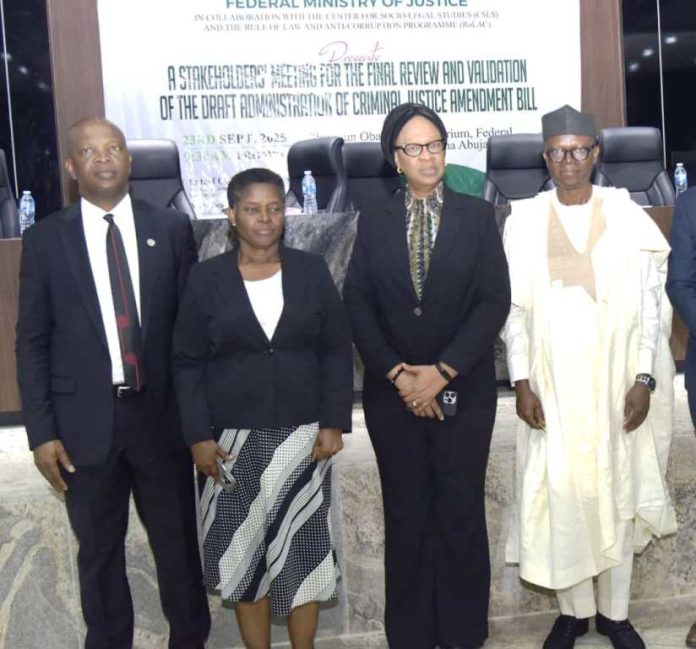
The Federal Government has reaffirmed its commitment to a fast, fair, efficient, and accountable justice system.
The Honourable Attorney General of the Federation and Minister of Justice (HAGF) Lateef Fagbemi SAN stated this today at the Ministry’s Auditorium, during a stakeholders’s Meeting for the Final Review and Validation of the draft Administration of Criminal Justice Amendment Bill.
The HAGF, represented by the Director Solicitor Mrs. Odegbaro, noted that the program comes at a pivotal moment—ten years after the enactment of the landmark legislation.
He highlighted the transformative role of the ACJA in harmonizing criminal procedures, reducing trial delays, protecting the rights of defendants and victims, and introducing innovations such as non-custodial measures and the abolition of arrest by proxy.
“Today, we are proud that all 36 States have adopted their own versions of the law, reflecting a shared national commitment to fairness, equity, and efficiency,” he stated.
Despite these achievements, the Minister identified persistent trial delays, congestion in custodial centres, limited access to digital justice platforms, and the need for stronger anti-corruption safeguards as challenges that necessitate urgent reforms.
He emphasized that under the Renewed Hope Agenda of President Bola Ahmed Tinubu, GCFR, the review process would consolidate lessons learned while preparing the justice sector for emerging realities.
“The Federal Ministry of Justice is also advancing complementary reforms, including the review of the Custodial and Non-Custodial Sentencing Practice Direction (2020) and enhanced training on non-custodial measures in line with the ACJA 2015 and the Nigerian Correctional Service Act 2019. These initiatives are expected to reduce overcrowding in correctional facilities and promote alternatives to imprisonment”. He added.
In her welcome address, the Director of the Administration of Criminal Justice and Reforms Department reaffirmed that the ACJA remains a landmark legislation. She outlined recent initiatives by the Ministry, such as the National Minimum Standards (NMS) approved by the Attorney-General, the rollout of Plea Bargaining Guidelines—with over 400 stakeholders trained—and the development of an Electronic Record of Arrest Database in collaboration with RoLAC and Galaxy Backbone.
“These interventions underscore the Ministry’s unwavering commitment to ensuring that the ACJA does not remain just a statute, but a practical instrument for justice, accountability, and human rights protection,” she noted.
Also speaking at the event, Professor Yemi Akinseye-George, SAN, President of the Centre for Socio-Legal Studies (CSLS), commended the collaborative efforts of the Ministry, CSLS, and the Rule of Law and Anti-Corruption (RoLAC) Programme in refining the draft amendments.
He emphasized the importance of the proposed reforms, which include mandatory pre-trial case management, reform of the “trial-within-trial” procedure, digitization of court processes, strengthening of non-custodial sentencing, elimination of de novo trials after judge transfers, and greater inclusiveness for persons living with disabilities (PLWD).
In a goodwill, the Director General National Drug Law Enforcement Agency (NDLEA), represented by the Secretary Mr Shedrak Haruna, commended the remarkable progress achieved since the enactment of the Administration of Criminal Justice Act (ACJA) 2015, noting that while significant success have been recorded, challenges in implementation have highlighted the need for continuous review.
He emphasized it’s partnership with the Federal Ministry of Justice and the Centre for Social and Legal Studies (CSLS) in developing the National Minimum Standards for the ACJA. This standards, which have undergone stakeholder Validation, reflect broad-base consensus and demonstrate collective commitment to reform.
Similarly, in his remarks, the representative of ROLAC Mr Joshua Dada, commended the remarkable progress achieved since the enactment of the to Administration of Criminal Justice Act (ACJA) 2015, noting that while significant successes have been recorded, challenges in implementation have highlighted the need for continuous review.
He emphasized its partnership with the Federal Ministry of Justice and the Centre for Social and Legal Studies (CSLS) in developing the National Minimum Standards for the ACJA. These standards, which have undergone stakeholder validation, reflect broad-based consensus and demonstrate collective commitment to reform.
“The review process is a vital opportunity to ensure inclusivity by drawing on the expertise of diverse stakeholders. Our collaboration underscores the reality that no single actor can drive reform alone. By working together, we aim to refine the Draft Bill in a way that enhances fairness, accountability, and efficiency in Nigeria’s criminal justice system,” he said.
Dada expressed optimism that the amended legislation, once finalized, will embody the collective aspirations of stakeholders and serve as a catalyst for strengthening the rule of law in Nigeria.
In attendance are the representatives of Chief Justice of the Federal High Court, Inspector General of Police and Comptroller of Prison.
Signed
Hauwa Bala
Head, Information & PR
23rd September, 2025





